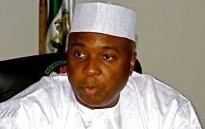
Saraki
Saraki Warns of More Defections As PDP Crisis Deepens
Former Senate President and Chairman of the Peoples Democratic Party (PDP) Reconciliation Committee, Bukola Saraki, has raised alarm over an impending wave of defections from the opposition party, cautioning that the worst may still be ahead.
Saraki, who spoke in an interview on Arise TV’s Prime Time on Friday, linked the looming defections to unresolved internal disputes and grievances among the party’s elite.
However, he noted that despite turbulence at the national level, the PDP’s grassroots support remains strong.
“When you travel across the country, the party is still very strong at the state and local government levels,” Saraki said. “Many grassroots members are unaware of the crises in Abuja. Their loyalty gives us hope, but we must address the root issues and rebuild.”
The PDP has been embroiled in leadership crises since its defeat in the 2023 presidential election, with factional clashes intensifying over the position of national secretary.
A recent dispute arose when the Independent National Electoral Commission (INEC) refused to recognise the party’s planned National Executive Committee (NEC) meeting, citing procedural irregularities.
Following discussions with INEC, acting National Chairman Umar Damagum announced the return of Samuel Anyanwu as the party’s secretary—a decision that has sparked discontent among some stakeholders.
Saraki identified the unresolved secretaryship tussle as a major obstacle, warning that further delays could deepen divisions.
“We should brace for more defections—possibly one or two governors and several senators,” he said. “The worst may still be coming. However, this crisis is an early wake-up call. If it had happened closer to the 2027 elections, recovery would have been nearly impossible.”
He expressed optimism about the party’s ability to rebound, citing its 26-year legacy, but stressed the need for urgent reforms.
Saraki also revealed that the PDP has begun preparations for the 2027 elections, emphasizing the importance of generational leadership change.
“This is not just about resolving today’s disputes but building for the future,” he said. “The next convention must bring in fresh, younger leaders to reposition the party.”
